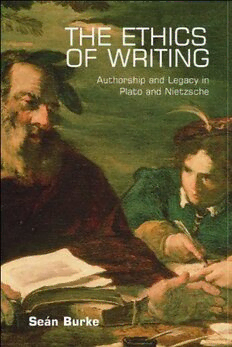
The Ethics of Writing: Authorship and Responsibility in Plato, Nietzsche, Levinas PDF
257 Pages·2008·1.015 MB·English
Most books are stored in the elastic cloud where traffic is expensive. For this reason, we have a limit on daily download.
Preview The Ethics of Writing: Authorship and Responsibility in Plato, Nietzsche, Levinas
Description:
The ethical question is the question of our times. Within critical theory, it has focused on the act of reading. This study reverses the terms of inquiry to analyse the ethical composition of the act of writing. What responsibility does an author bear for his legacy? Do 'catastrophic' misreadings of authors (e.g. Plato, Marx, Nietzsche) testify to authorial recklessness? These and other questions are the starting-point for the development of a theory of authorial ethics.Beginning with a discussion of Plato's argument in Phaedrus that writing is dangerous because it can neither select its audience nor call upon its author to the rescue, Burke goes on to analyse the dangerous game which Nietzsche played with posterity, and the ambiguous status of writing within the ethical thought of Emmanuel Levinas. At issue is how authors may protect against 'deviant readings' and assess 'the risk of writing'. Burke recommends an ethic of 'discursive containment'. Continuing the mission of the 'returned author' begun in his pioneering book The Death and Return of the Author, Burke recommends the 'law of genre' as a contract drawn up between author and reader to establish ethical responsibility. Criticism, under this contract, becomes an ethical realm and realm of the ethical.
See more
The list of books you might like
Most books are stored in the elastic cloud where traffic is expensive. For this reason, we have a limit on daily download.
